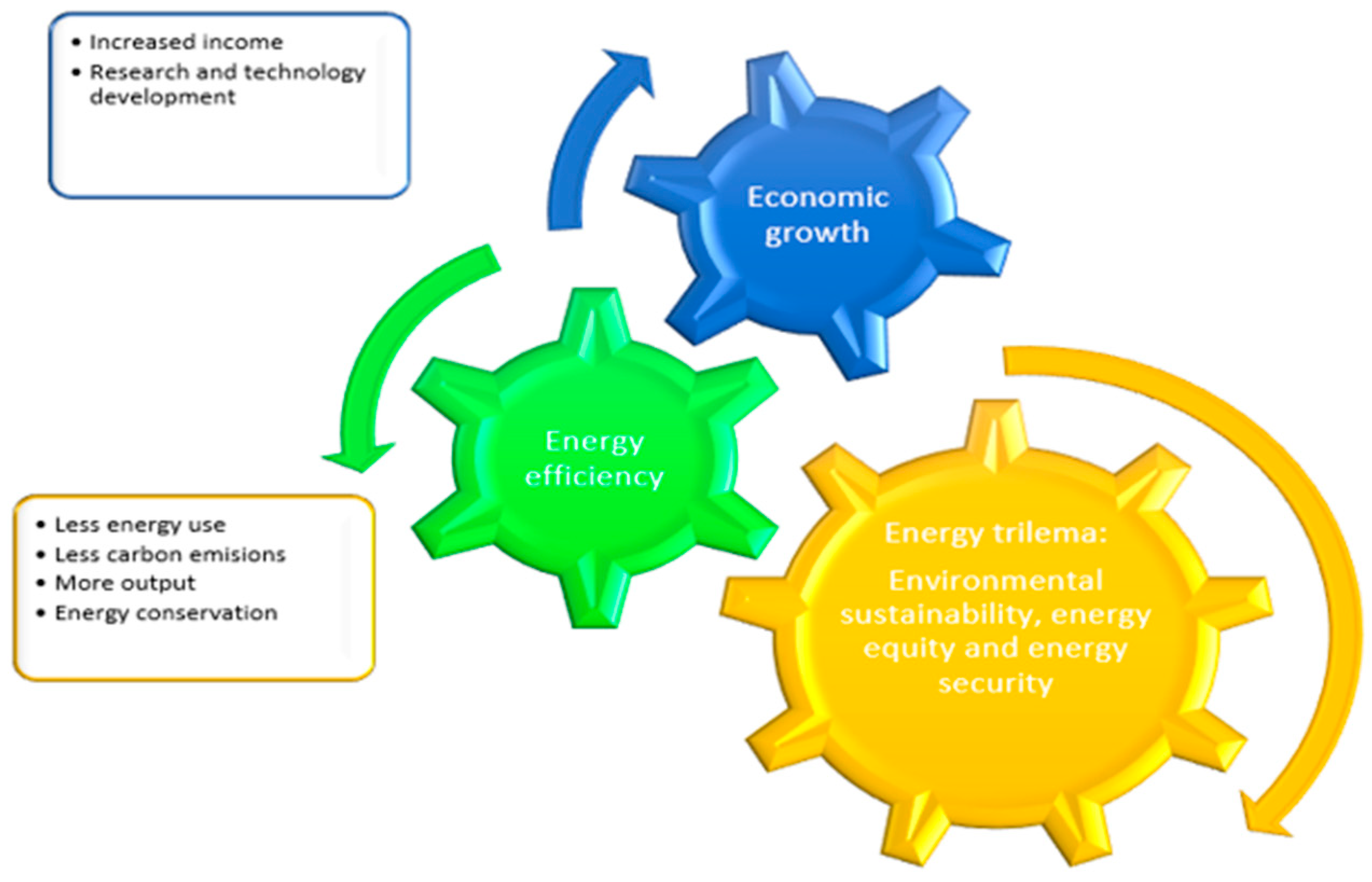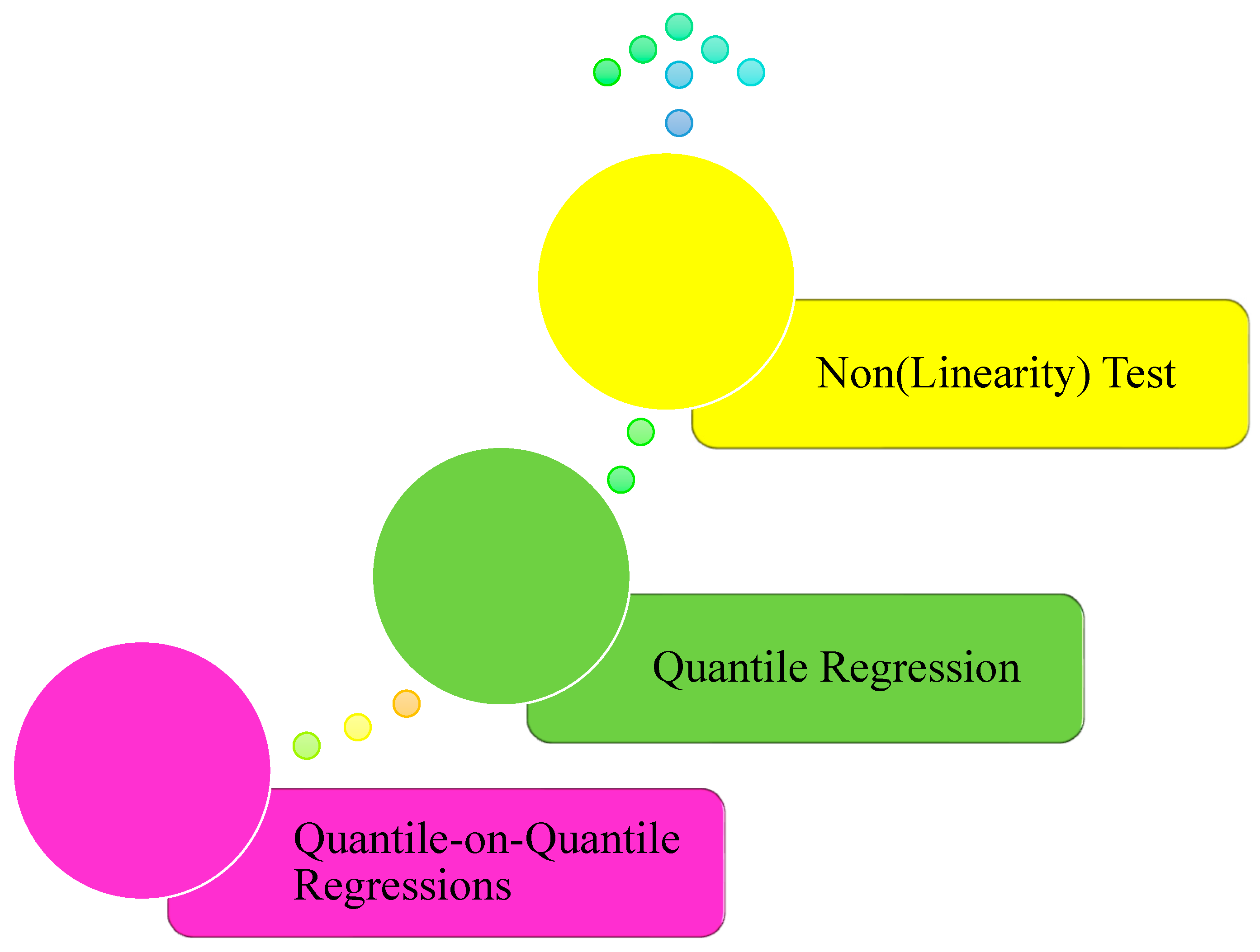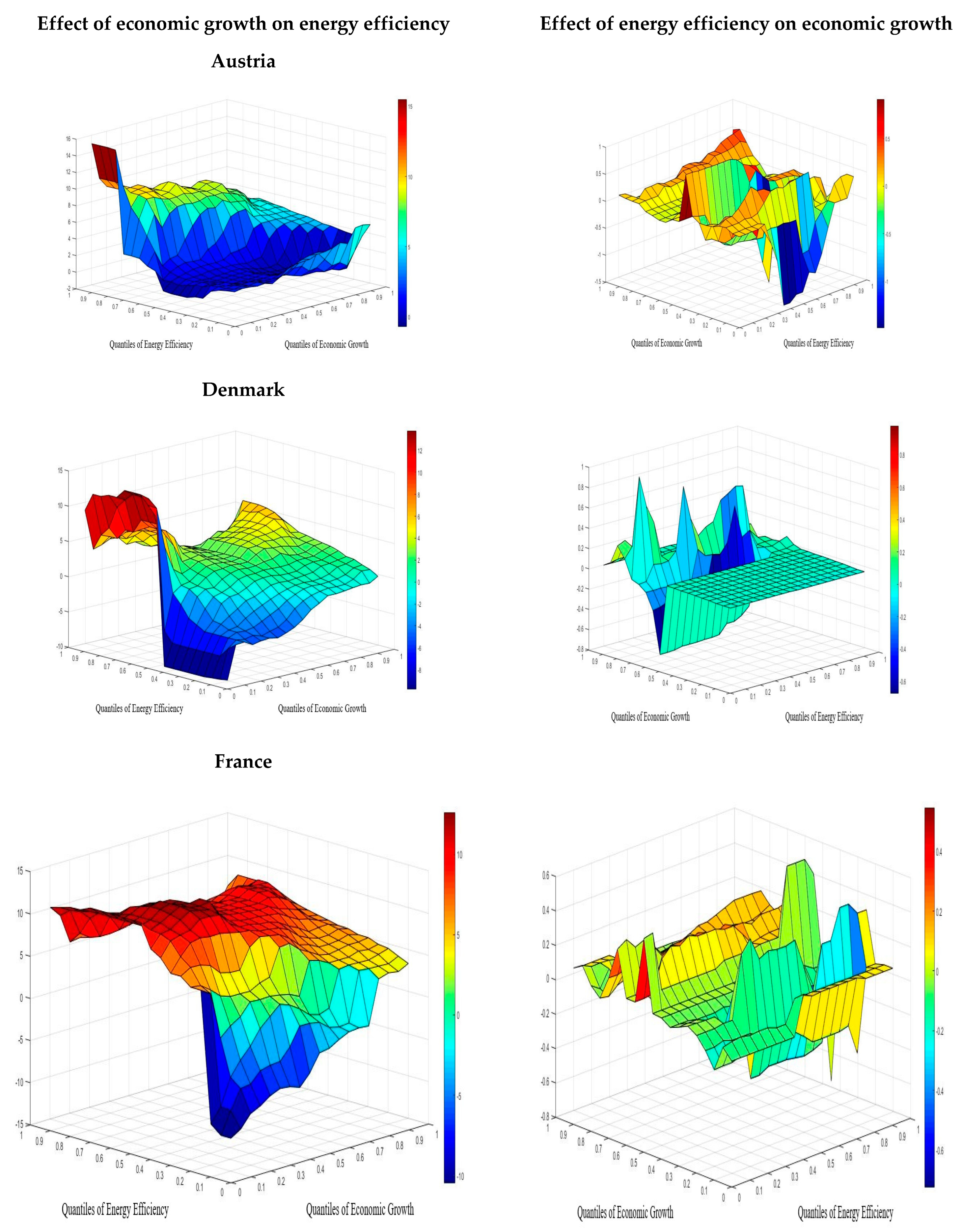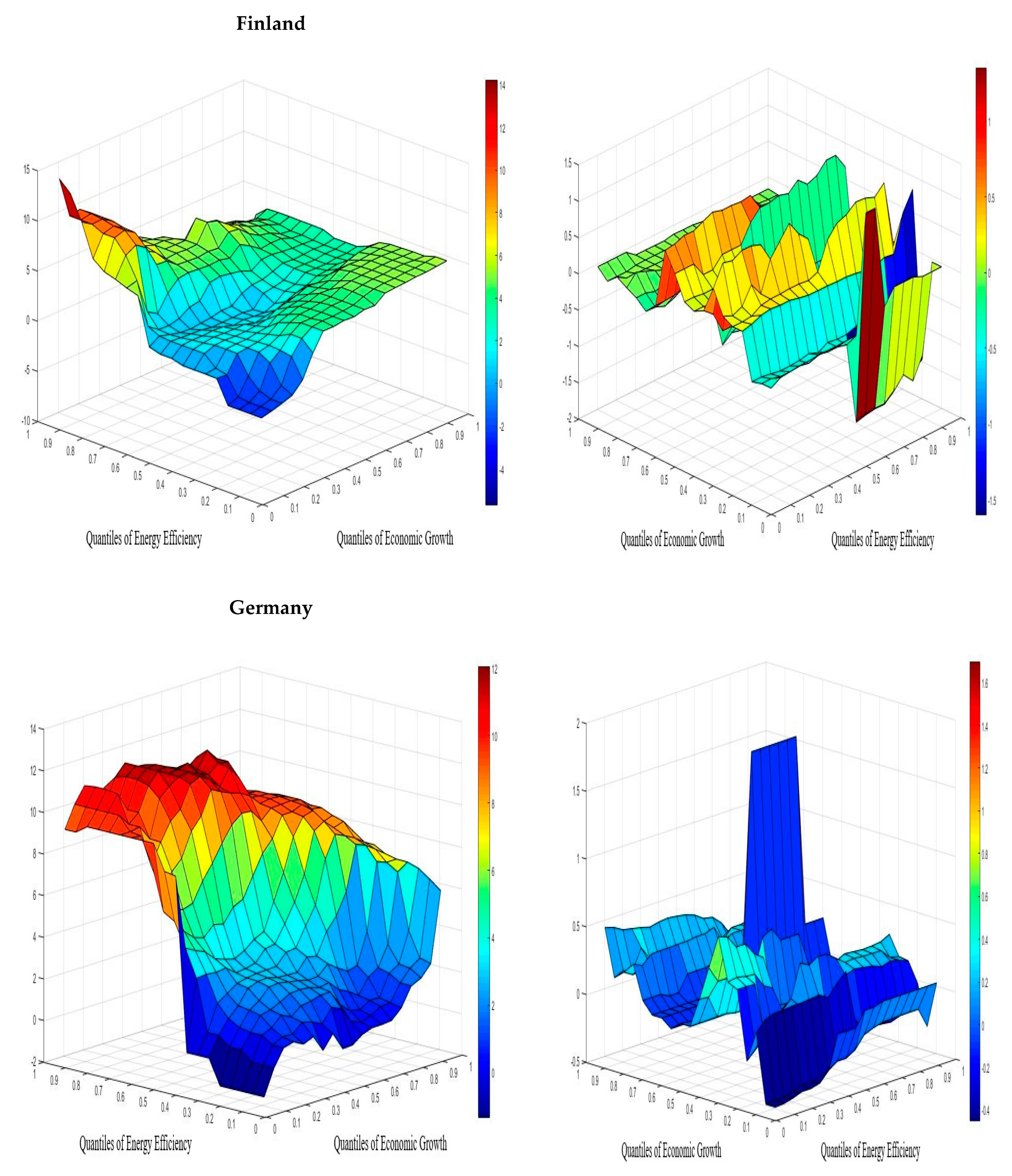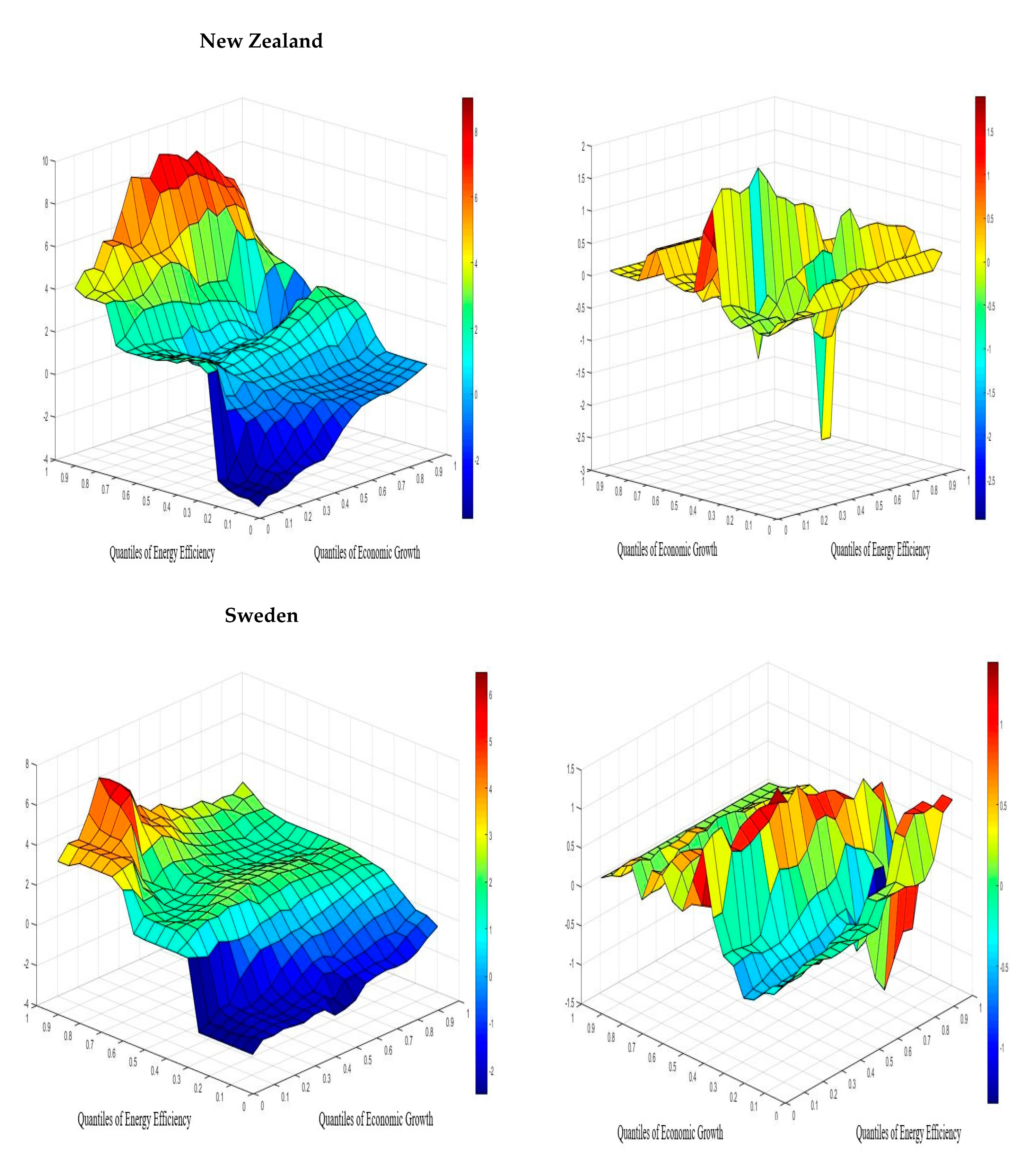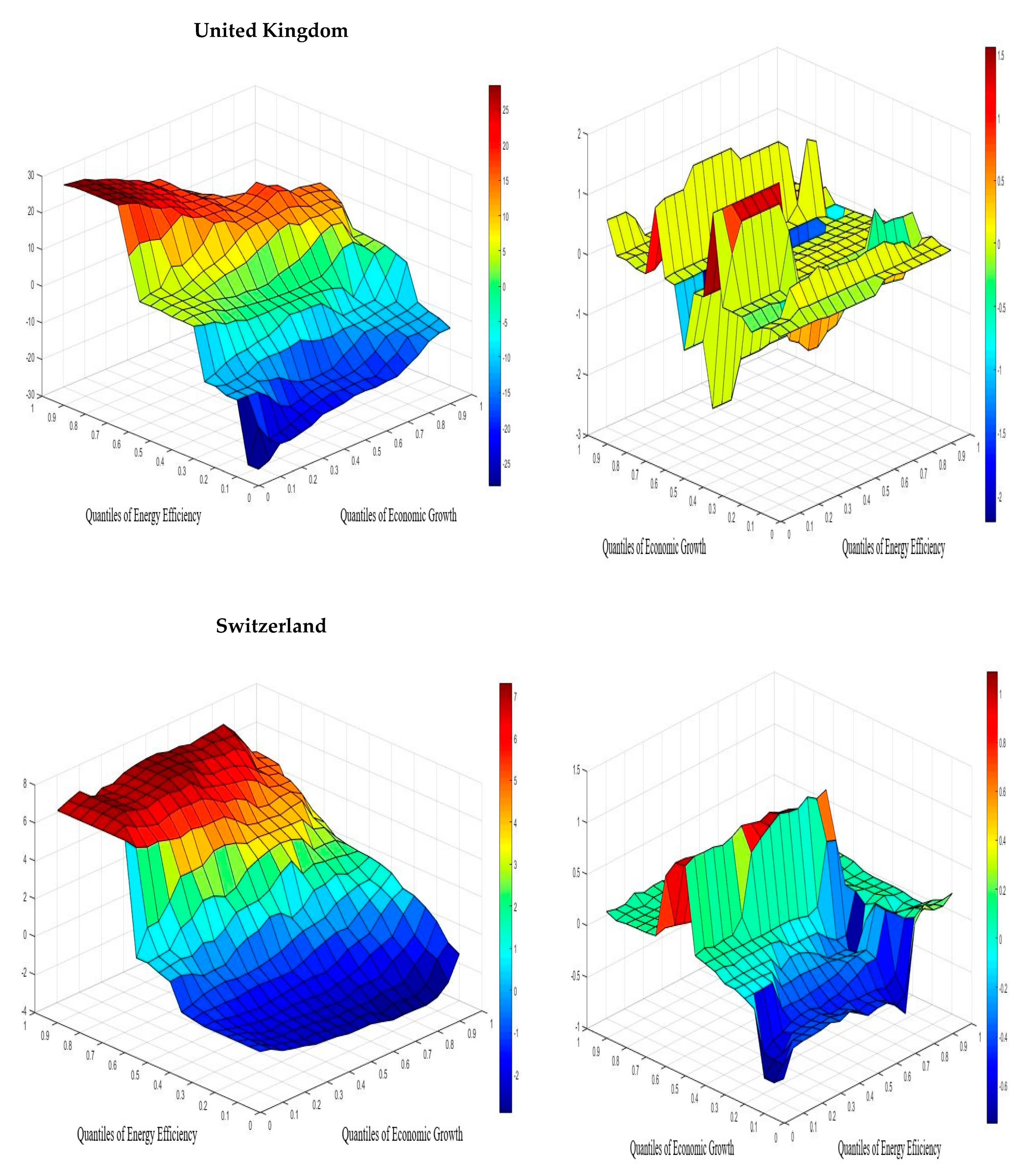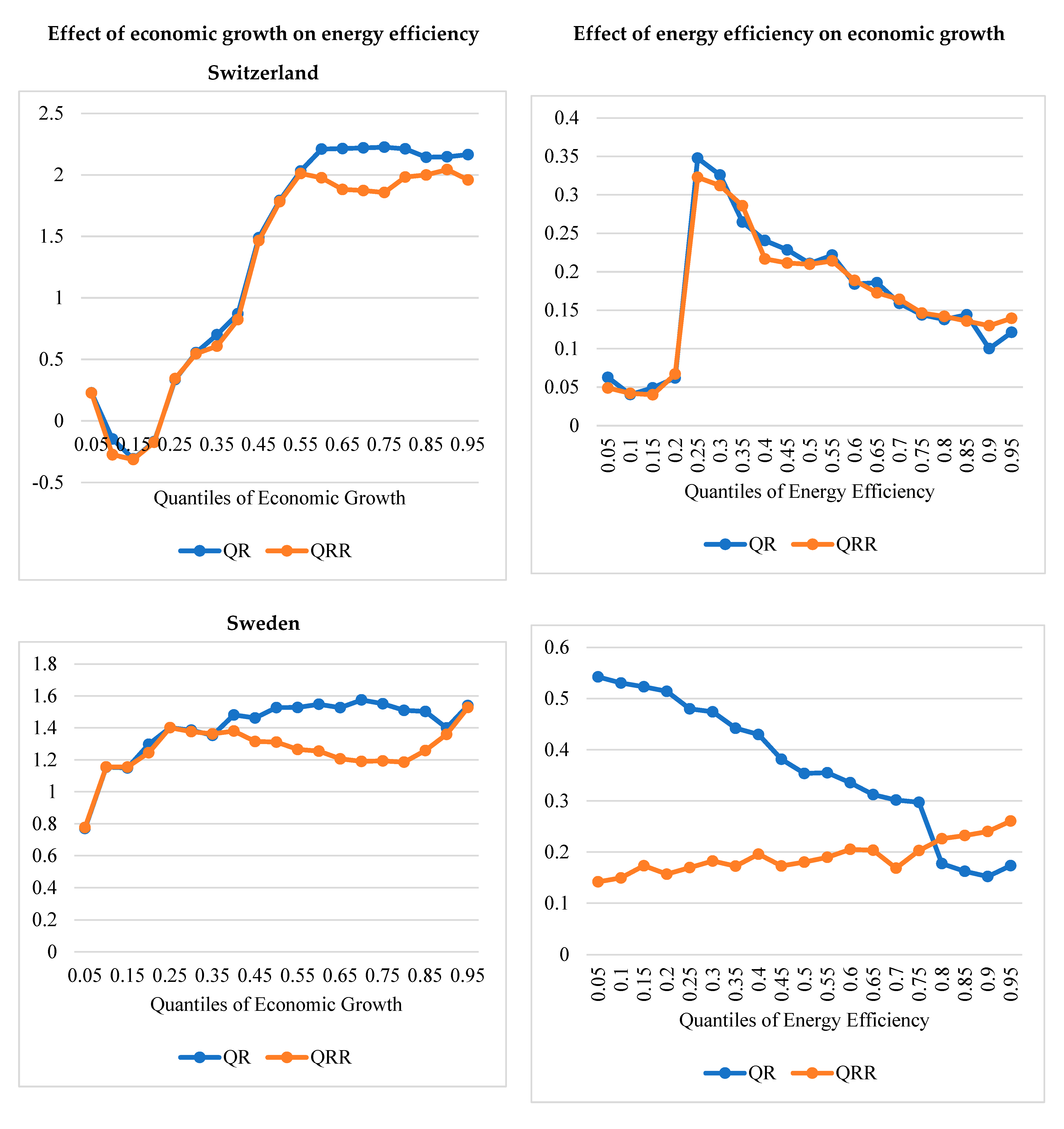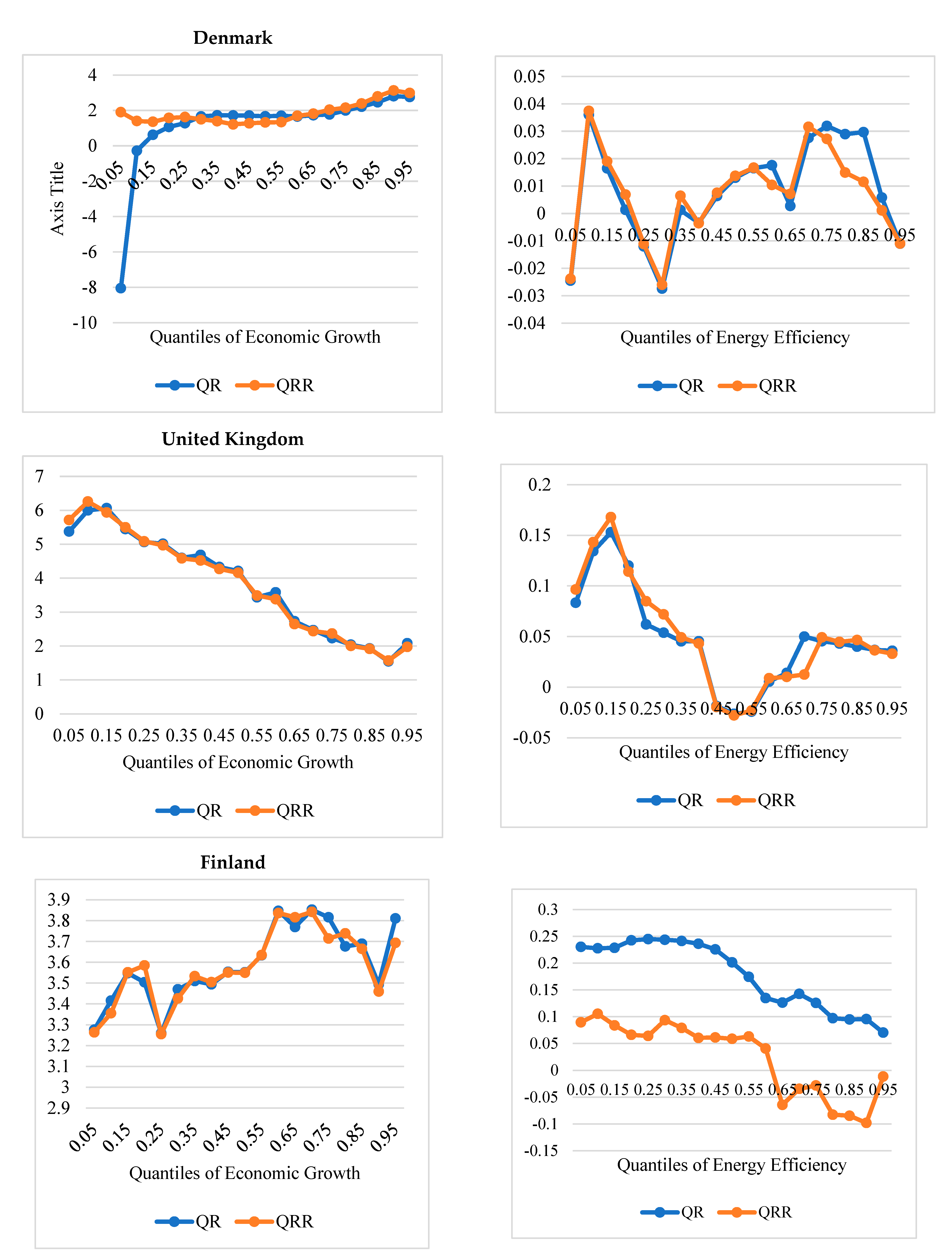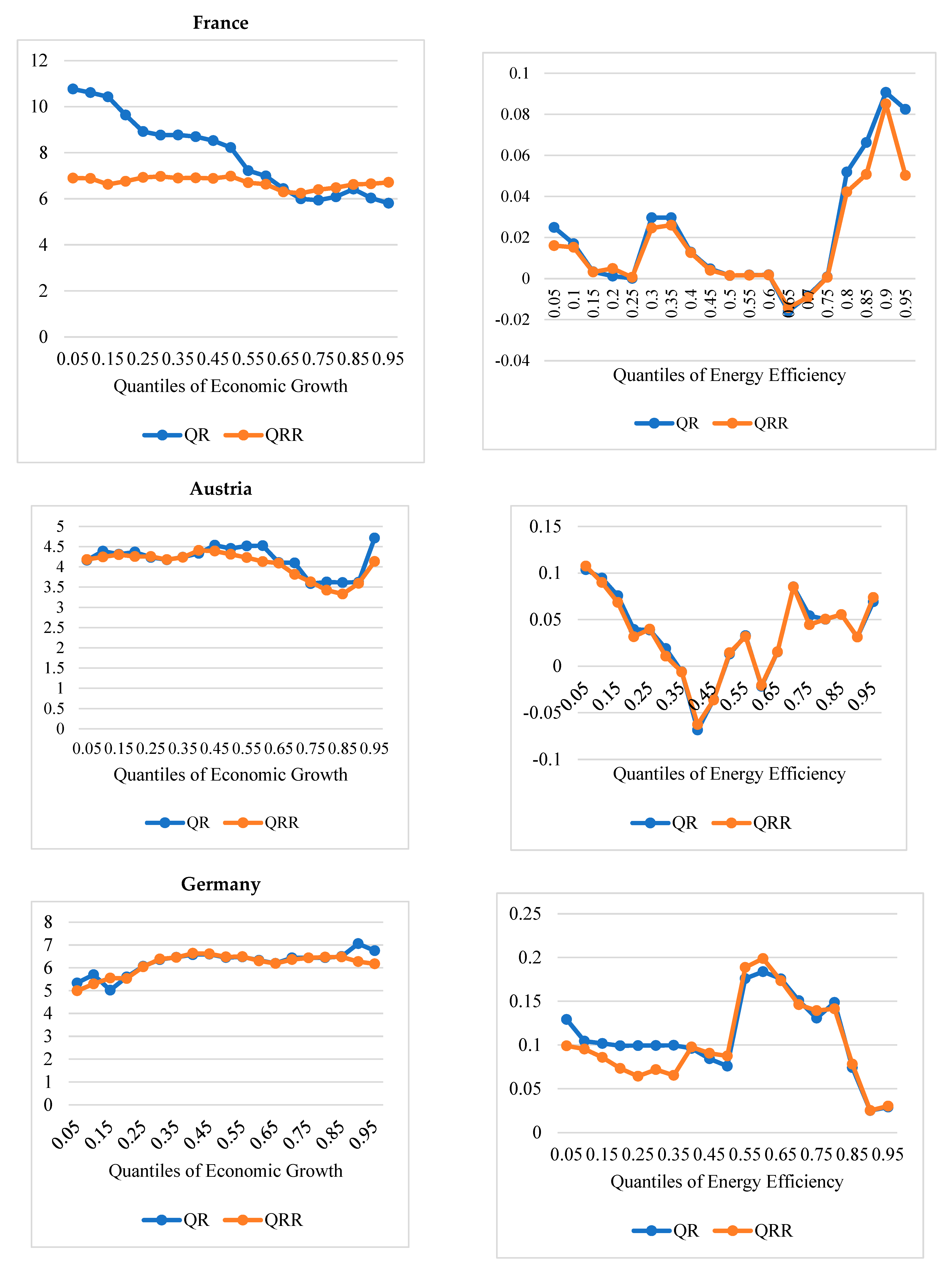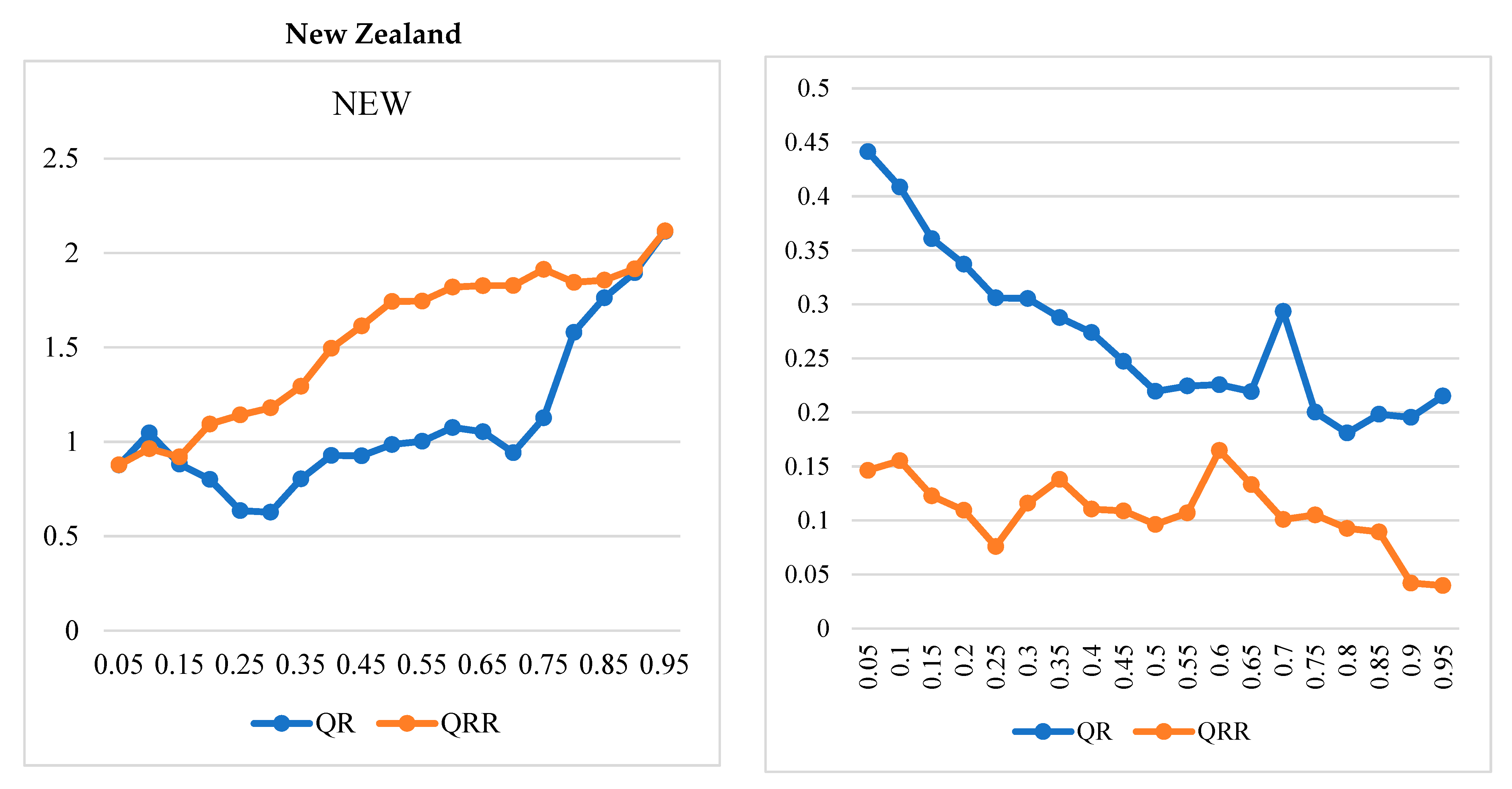Abstract
The World Energy Council has consistently formulated useful policies and ranked countries in term of their performances in environmental sustainability, energy equity, and energy security. In a novel approach, and possibly in one of the most unique studies in the World Energy Trilemma literature, the current study examines the interaction of energy efficiency and economic growth of several top-performing economies (Austria, Denmark, France, Finland, Germany, New Zealand, Sweden, Switzerland, and the United Kingdom) in respect to environmental sustainability, energy equity, and energy security. Importantly, while affirming the inappropriateness of the linear econometric approach, the study utilized the newly developed quantile-on-quantile approach to examine the dataset for the period 1990Q1 to 2018Q4. As such, the result largely indicates a significant and positive effect of economic growth toward the energy efficiency across the quantiles for the examined countries (Austria, Denmark, France, Finland, Germany, New Zealand, Sweden, Switzerland, and the United Kingdom). On the other hand, energy efficiency also impacts economic growth in most parts of the quantiles in the examined countries. However, the results show weak and negative interaction in the lower quantiles (average of 0.1–0.3) only for Denmark, Germany, and New Zealand, while the results further reveal weak and negative interaction in the middle quantile (average 0.4–0.6) for France, Finland, and Sweden. Importantly, this study presents useful economic-related policy inferences from the aspects of energy efficiency, energy security, energy equity, and environmental sustainability.
JEL Classification:
O5; Q4; Q56
1. Introduction
Economic growth has remained a pertinent desire of most nations, as it is potentially causing an increasing global energy demand. Consequently, the global target of reducing global warming by reducing energy consumption proves difficult to achieve. However, where growth occurs simultaneously with development, an increase in economic activities can occur without an increase in energy use, which implies less emission of carbon while more energy is conserved. This can be achieved through advanced production methods and technical efficiency, whereby the least possible amount of energy is employed in producing a unit of output [1,2,3]. Therefore, energy efficiency is considered to be a precondition for expanding economic activity with the least cost [4,5].
Earlier, studies established the link between energy efficiency and the economy based on factors other than the qualities of their energy policies [5,6,7,8,9]. For instance, while the study by [7], was based on regional analysis, refs. [10,11] assessed large energy consumers, refs. [5,12,13] based this relationship on the criteria of income levels, while [8,14] Lin and based this relationship on the quality of economic growth. In this study, we argue that policy that pursues the energy transition is a bedrock of energy efficiency for economic development. The call for sustainable energy by the World Energy Council emphasizes the three dimensions of energy equity, energy security, and the environmental sustainability of energy systems for a successful energy transition [15].
According to the [16], the three aspects of energy policies, captioned as the energy trilemma, present competing priorities to policymakers. First, there is a compelling need to develop an energy system that produces the least environmental cost in both energy use and the energy production process. Secondly, another policy posits the need to ensure an uninterrupted energy supply and its affordability. Finally, a policy addresses the need to optimize the primary energy resources, provide reliable and sustainable energy infrastructure at minimum cost, and minimize the cost of usage in the production of the maximum possible amount of goods. Thus, the attainment of energy transition success as measured by the Energy Trilemma Index has implications for the economy of successful countries in this quest [17]. In recent times, there have been studies on the aspects of the policies [18,19,20,21,22,23,24]. The existing studies did not point out the significance of energy efficiency to the economic growth of countries with outstanding performance, see also [25,26].
Given the indication of improved energy efficiency in countries that have remarkable performance in the Energy Trilemma Index, it is apparent that the attainment of energy efficiency is technically possible if there is a synergy between the three dimensions of the energy trilemma [26]. Refs. [17,26] underscored the need to learn from such countries so that other countries can pursue a more coherent energy policy for economic development. Furthermore, the energy trilemma has become an essential component of contemporary economic development [14]. The establishment of the link between economic growth and energy efficiency should be based on the exceptional characteristics of energy policy and systems. It is on this premise that this study aims to find out how energy efficiency enhances economic development within this context. This research, therefore, reveals this relationship in the economies that are successful in the three dimensions of the energy trilemma scores.
Given the background of the energy trilemma information alongside the macroeconomic goal for steady economic growth of the aforementioned countries, it is worthwhile to explore the relationships between the countries’ energy efficiency and economic growth, as in Figure 1. This study’s objective is designed to assess the interaction of energy efficiency with the GDP of each of these countries. Since energy efficiency and economic growth are both inherent in the Sustainable Development Goals (SDGs), we evaluate the energy efficiency goal among the targets of energy policy and the relationship this has with the macroeconomic goal of economic growth. Moreover, the energy trilemma issues are interwoven, such that energy efficiency policy enhances energy security and reduces the environmental costs of energy use [10,27,28]. The energy trilemma, as documented in the World Energy Council report, implements an annual Energy Trilemma Index to rank countries (for instance, Austria, Denmark, France, Finland, Germany, Luxembourg, New Zealand, Sweden, Switzerland, and the United Kingdom in the 2019 energy trilemma) according to energy equity, energy security, and environmental sustainability performances. With that year’s ranking, Norway scored the highest in energy security, Sweden had the highest score in energy equity, while Canada ranked first in environmental sustainability. The ability of these countries to balance their trilemma according to their needs earned them the top ten positions, which could be a reference point for other countries in respect to energy transition.
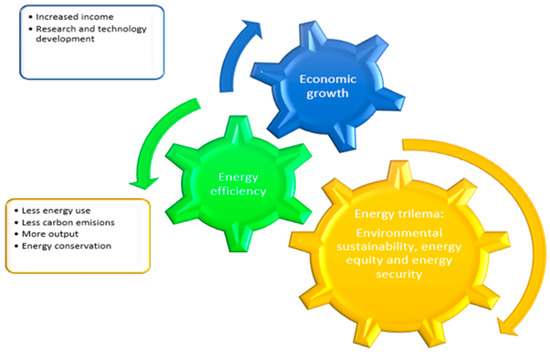
Figure 1.
The interaction of energy efficiency and economic growth amidst the energy trilemma. Source: Authors’ computation.
In respect to the contribution, this research endeavor is billed to deliver a novel approach from two perspectives: (1) the study utilizes the annual Energy Trilemma Index ranking that accounts for the world’s leading economies in terms of environmental sustainability, energy equity, and energy security, and (2) a recently developed quantile-on-quantile approach by [29] also provides the relationship between the variables of concern, especially over the entire quantiles, as against a mean-based approach. This is an unusual model in the investigation of the energy efficiency–economic growth relationship in the literature. Being an improvement over the traditional quantile regression (QR) model, the QQ approach has the capacity to incorporate the fundamentals of QR and nonparametric estimation research. It provides a more detailed assessment of the relationships, as it reveals how the quantiles of energy efficiency influence the quantiles of economic growth and vice versa. As a result, the method appears to transform the quantile of one parameter into another, and the results are able to provide answers to the question: What is the nexus of energy efficiency and economic growth at each quantile? The study concludes that the findings include a comprehensive representation of the linkage of the dimension of energy efficiency and economic growth that is not feasible using traditional approaches. An evaluation of these countries in their admirable energy sustainability status also provides useful and exemplary results in policy making. Lessons therein are practicable and able to motivate the countries across the globe to pursue energy-saving goals, seeing that economies can transition to cleaner production with a minimal energy cost even as they pursue economic development. This is made possible by developing a coherent energy policy where energy demand is reduced, thereby reducing the impact of energy use on the environment and increasing the chance of energy access for all through energy conservation.
The structure of the manuscript is of a specific order. Related theoretical and empirical studies are discussed in Section 2, while Section 3 presents the methodology of the study. In Section 4 and Section 5, the employed dataset, results of the estimation approaches, and conclusion insights are all presented, respectively.
2. Literature Review
In this section, the theoretical background and relevant empirical literature are detailed in separate subsections.
2.1. Theoretical Background
The interaction of energy efficiency with economic growth is drawn from the traditional theory of production, whereby two or more inputs are combined in the production process. The use of primary inputs in production is ideal; however, when combined with some levels of technology, productivity can be increased [30]. Therefore, by increasing technology, fewer primary inputs will be required for the same level of production. On the reverse side, economic growth enhances energy efficiency because the energy transition process depends on technological development. As society faces the need to combat environmental pollution by reducing energy consumption, an increasing income motivates the need for research and technological development that further enhances increased productivity with fewer environmental costs [2,5]. At a reduced cost of production, more funds can be invested in energy conservation policies. In addition, economic factors associated with economic growth aid the development of technology for energy efficiency, such as foreign direct investment, trade, economic policies, and degree of economic openness, which aid technology transfer [31,32,33,34,35,36].
The choice between energy efficiency and economic growth could sometimes be a tradeoff [37]. Energy efficiency enhances economic growth, provided it does not crowd out other non-energy-intensive investments. However, the potential positive effect of energy efficiency may be reversed, such that output growth drops if there is a crowding out of nonenergy sectors by overwhelming research and technological innovations in energy-intensive sectors [38]. If both energy efficiency and economic growth targets are well-balanced and effectively managed, this relationship would rather be complementary or mutual than a tradeoff. According to [38], where technological growth is exogenous, energy efficiency improvement will not affect long-run economic growth. Thus, the predictability of economic growth depends on country-specific characteristics and the choice of energy policy.
2.2. Empirical Literature
Preceding studies have considered the two pioneer theses that energy utilization influences economic growth, and that economic growth leads to the demand for more energy [39,40,41,42,43,44,45,46]. These and more shreds of evidence tend to shed light on the direction of energy policy options and whether to adopt energy conservation policies or not, depending on the established relationship of energy consumption with economic growth [47]. Even though there has been no unified agreement in extant studies that link economic growth to pure energy consumption, the Intergovernmental Panel on Climate Change (IPCC) [48] points out that the energy–economic growth relationship should be considered beyond the context of pure economic development, and that this should incorporate environmental sustainability and sustainable growth. Ref. [49] provided evidence that both economic growth and environmental quality could improve simultaneously due to the transition to sustainable energy. This suggests that beyond growth, the environment and resource conservation policies may also benefit from energy use if measures of energy efficiency are considered. Energy efficiency through efficient utilization of clean energy sources offers pathways to sustainable economic development [9,50].
In the high- and middle-income countries, a long-run causal relationship exists between energy efficiency and economic growth [5]. In emerging market economies, energy efficiency has a long-run positive impact on economic growth, while a one-way causal impact of energy efficiency on economic growth in the short term is an indication that there are accompanying features of energy efficiency that help to predict economic growth of the emerging market economies [6]. For the BRICS economies, energy efficiency and economic growth mutually interact [8]. Ref. [8] further provide evidence that energy efficiency is vital for economic growth among the BRICS, with positive effects across all the quantiles in their analysis. This suggests that one of the dividends of energy efficiency is the remarkable success of the BRICS economies.
Evidence from individual countries shows that improvement in energy efficiency increases the GDP of Canada [2], China [10], and India [11]. The model from India showed one-way causation from economic growth to energy efficiency both in the short and long run [11]. Energy efficiency also stimulates economic growth in the United States [12]. Ref. [51] used the model of the Cobb–Douglas production function to assess the trends in energy efficiency and economic activity in the United States, and the result suggests that improved energy efficiency must be responsible for the observed increase in output per worker. Ref. [14], the impact of energy efficiency on the quality of economic growth in China showed nonlinear characteristics and diverse responses of quality growth to energy efficiency across regions. The Netherlands had an annual aggregate improvement rate of about 1.4% in energy efficiency between 1980 and 1995 without a significant structural change in some sectors over the same period; however, energy-intensive subsectors witnessed significant and faster growth at the same time [52]. There may have been crowding out of non-energy-intensive sectors, as suggested by [38]. Ref. [53] also found that economic growth pressure hindered energy efficiency improvement through investment imbalance and crowding-out effects. Through an input–output analysis, ref. [54] showed how energy efficiency through quality investment in renewable energy sources improves economic growth in Italy by its positive contribution to occupational performance. Ref. [37] proved that energy efficiency improves economic growth by its positive contribution to total factor productivity in manufacturing. Earlier, ref. [3] confirmed that energy efficiency is higher in countries with higher total factor productivity. This is a reflection of more efficient use of inputs in production which, in due course, result in economic growth.
An analysis of 11 European Union countries shows that both economic growth and investments drive higher energy efficiency [7]. There is more proof that energy efficiency improves with more economic growth activities. It is driven by industries [55], technological growth [28,56,57], public finance and capital investment in efficient technologies [58,59], as well as investment in research and development [33]. The response of energy efficiency to economic growth could depend on the level of income. In that respect, ref. [13] analyzed how both lower- and middle-income economies respond differently to energy intensity as an indicator of energy efficiency. For upper middle-income economies, economic growth has a negative impact on energy efficiency, but for lower middle-income countries, economic growth has a positive impact on energy efficiency. This implies that as countries reach for higher levels of income, the relationship between economic growth and energy efficiency becomes negative. On the contrary, ref. [60] analyzed energy efficiencies with the total-factor energy efficiency index, which includes energy inputs, and the result revealed that energy efficiency declines at initial stages of per capita income but improves at the latter stages, resulting in a U-shape relation. Ref. [33] showed that energy efficiency in China is driven by income gains, but in more industrialized regions. Their results have no indications that energy efficiency responds to the economy of less industrialized regions.
While there have been group- and country-level analyses of energy efficiency and economic growth relationships, the literature is yet to show the energy efficiency–economic growth relationship in the countries that have recorded huge successes in energy transition. Ref. [26] earlier showed the importance of energy efficiency in renewable energy development in this group of countries. Among the 12 best-performing countries in the 2021 energy trilemma reports, energy efficiency, among other factors, positively drives renewable energy development, while economic growth plays a significant role in their sustainable energy development [26]. These countries should draw more significant attention in empirical studies based on the qualities of their energy policies which have yielded desirable results. According to [49], energy transition is significant in the determination of sustainable economic development. This study now examines the role of energy efficiency in the economic growth of these countries which are considered successful in the energy transition. Establishing this link within this context is an assessment of this type of energy policy tool for productive efficiency, which has not been provided in the literature. This study followed the 2019 Energy Trilemma Index, which is an assessment of selected top 10 countries that are considered the most energy-efficient countries. The analysis of the link between energy efficiency and economic growth in these countries is based on this assessment for more reliable inferences about the energy policy.
It is noteworthy that addressing the issues in the energy trilemma does not follow the same course in all countries; thus, it does not produce the same results. A comprehensive assessment of energy performance of the top 10 countries in the 2015 World Energy Council’s Energy Trilemma Index by [61] suggests that countries address the conflicting energy issues according to their preferences among the trio. For instance, while [62] considered that Iceland, Greece, New Zeeland, and Norway performed well in balancing the trilemma, Ireland, the UK, and the USA were considered to have underperformed in this regard. In the same vein, out of 20 countries assessed, ref. [25] considered Australia, China, Japan, Saudi Arabia, and Poland to be the most energy-efficient countries, while Mexico, Indonesia, Russia, and Brazil were the least in terms of energy efficiency. For this reason, each country has been distinctly assessed in this study, and the uniqueness of the changing interaction between their economic growth and energy efficiency across different quantiles was observed. Thus, the asymmetric and spatial properties of the relationships over time are being observed through the unusual quantile-on-quantile (QQ) estimation technique.
3. Data and Methodology
This part will present the description (regarding the source of dataset and statistical properties) of the dataset and the estimation approaches that have been employed.
3.1. Data
The present research assesses the dimension of interaction of economic expansion and efficient use of energy among the top Energy Trilemma Index countries (Austria, Denmark, France, Finland, Germany, New Zealand, Sweden, Switzerland, and the United Kingdom). In doing so, and by excluding Luxembourg due to data restriction, the study uses gross domestic product and energy efficiency. The study uses quarterly data spanning between 1990Q1 and 2018Q4. The descriptive statistics are depicted in Table 1, and the outcomes of the Jarque–Bera probability revealed that the majority of the series did not conform to normal distribution, which illustrates that using linear techniques to examine this relationship will yield misleading results. Furthermore, we conducted a nonlinearity test among the series using the non-linearity test [63], otherwise known as BDS) proposed in [63]. The outcomes of the BDS test are presented in Table 2. Based on the outcomes of the BDS test, we failed to reject the null hypothesis of nonlinearity. The outcomes of Jarque–Bera probability and BDS confirm that the linear techniques cannot be utilized in this empirical analysis. Thus, we utilized the quantile-on-quantile (QQ) regression to catch the interconnection between efficiency of energy and GDP. In the existence of data nonlinearity and nonnormality, quantile regression is the most effective approach that has provided robust estimates while making simple data distribution assumptions. Thus, the current study utilizes the quantile-on-quantile (QQ) method illustrated by [29] to assess the asymmetric interconnection between economic growth (GDP) and energy efficiency (EF) in Austria, Denmark, France, Finland, Germany, New Zealand, Sweden, Switzerland, and the United Kingdom. As an advantage, it is believed that the QQ technique combines both the nonparametric and quantile regression methods to capture the asymmetric and spatial properties of the framework over time.

Table 1.
Descriptive statistics.

Table 2.
Results of the BDS test for nonlinearity.
3.2. Methodology
This section provides a brief description of how this research used the QQ technique of [29] to evaluate the interaction of economic expansion and efficient use of energy. Researchers can look into how one indicator’s quantiles affect the quantiles of another indicator using the QQ technique, which is an upgrade of the conventional quantile regression (QR) model. The QQ technique uses a combination of QR and nonparametric estimating. First, traditional QR is used to estimate the impact of independent factors on the various quantiles of the dependent variable. The phase of the analysis is shown as follows.
First Phase: In the initial phase, the study explored the nonlinearity characteristics of the series of investigation. In doing so, the BSD test suggested was found suitable.
Second Phase: In the second phase, we used the quantile-on-quantile regression to capture the effect of the explanatory variable quantiles on the dependent variable quantile.
Third Phase: In the third phase, we evaluated the robustness of the quantile-on-quantile regression via quantile regression. Furthermore, Figure 2 presents the illustration of the phase of analysis.
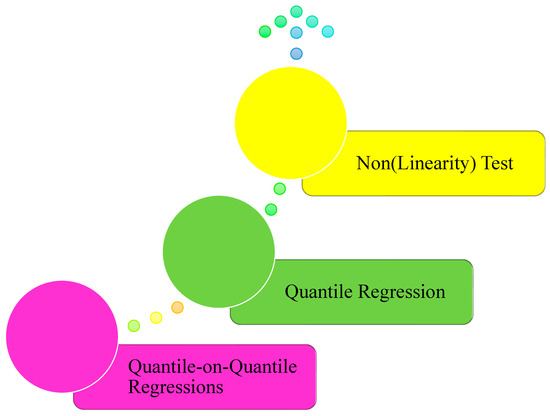
Figure 2.
Flow of analysis.
4. Results and Discussion
This section of the study discusses the nexus of economic expansion and efficient use of energy. Figure 3 signifies the estimates of quantiles on quantiles.
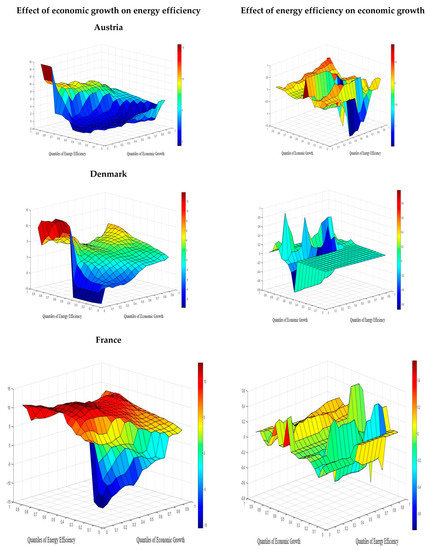
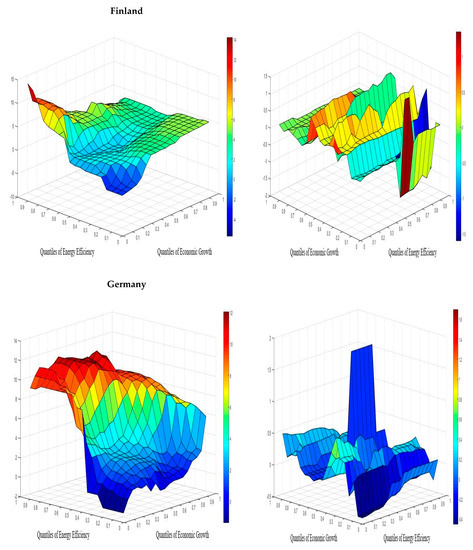
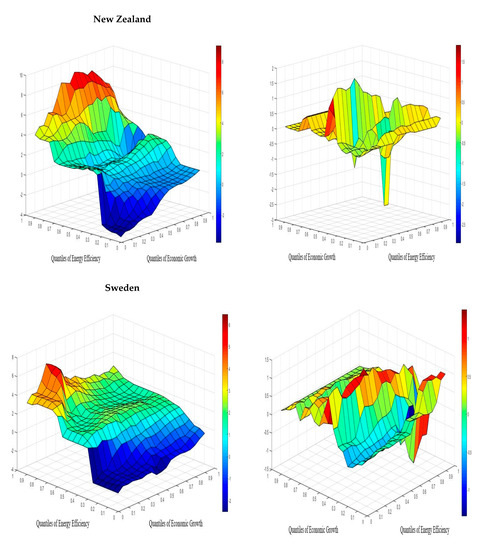
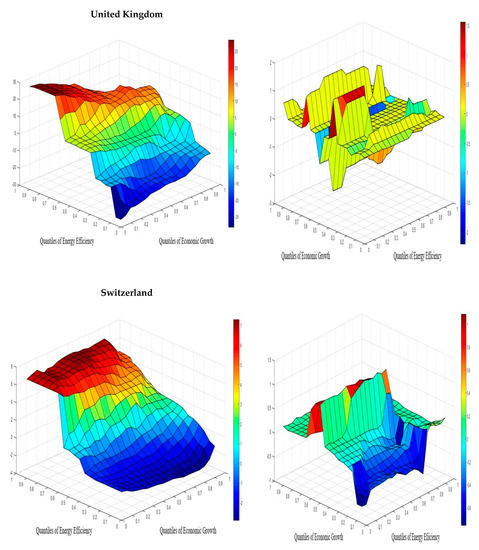
Figure 3.
Quantile-on-quantile (QQ) estimates of slope coefficient, . Source: Authors’ computation.
In the case of Austria, a positive and significant influence of GDP on energy efficiency is shown in all the grids (0.1–0.9). This impact is constant throughout the qualities of energy efficiency. Fascinatingly, a lower quantile of economic growth illustrates the maximum effect on an upsurge in energy efficiency that is positive. These outcomes portray that at the early stage, the influence of GDP on efficiency of energy is stronger. In summary, GDP enhances energy efficiency in all quantiles. This observation is valid, considering that the general government revenue and government spending, especially among the Organization for Economic Corporation and Development (OECD) member countries, is highest for some European Union (EU) member states: Sweden, Austria, Belgium, France, Denmark, Finland, and Norway [64]. It then translates that these countries potentially have significant resources to finance their respective energy development and energy efficiency policies. Thus, this is the reason energy efficiency, especially of end-use sectors, reportedly improved by 30% (with annual average rate of 1.4%) between 1990 and 2016 among the EU-28 member states according to the European Environment Agency [65]. On the other hand, the interconnection between economic growth and energy efficiency produces various outcomes in all quantiles. While investigating the effect of economic growth on energy efficiency in Austria, we notice a positive and significant influence of energy efficiency on GDP at low quantiles (0.15–0.25). However, in the middle quantiles (0.3–0.7), the efficiency of energy impacts economic growth negatively. Additionally, in the high quantiles (0.7–0.9), energy efficiency influences GDP positively. In summary, efficiency of energy influences economic growth positively. This observation is not far from the reality that Austria is among the five EU countries with the highest energy consumption by end-use-per-dwelling as at 2016 [65]. Specifically, the [65] EEA report opined that energy consumption by end-use-per-dwelling among the EU member countries is highest in Luxembourg, Finland, Norway, Belgium, and Austria. Moreover, the report hints that the energy utilization pattern is reportedly highest for the purpose of space heating, water heating, cooking, and lighting and electrical appliances.
For the case of Denmark, at lower quantiles (0.1–0.2), the impact of GDP on energy efficiency is weak and negative. However, in the middle and high quantiles (0.25–0.95), the effect of GDP on energy efficiency is positive. This result indicates that an upsurge in GDP is accompanied by a rise in energy efficiency in the middle and high quantiles. On the flipside, there is a negative and significant influence of energy efficiency on GDP which is persistent in the lower and middle quantile (0.3–0.7), while in the high quantile (0.7–0.9), the influence of energy efficiency on GDP is positive. This simply means that in the high quantile, an increase in economic growth increases energy efficiency. To summarize, these outcomes show that both energy efficiency and economic growth have a negative and positive impact on each other at different quantiles. Similar to the reason ascribed for Austria above, the positive and feedback relationship between economic growth and energy efficiency, especially in the upper quantile, perfectly explains the wealth effect arising from a country’s recent economic performance.
In the case of France, economic growth influences energy efficiency positively in lower quantiles (0.1–0.4). However, in the medium quantiles (0.4–0.7), the impact of GDP on energy efficiency is negative. Nonetheless, in the high quantiles (0.7–0.95), the influence of economic growth is strong and positive. In summary, in the lower and higher quantiles, the influence of GDP on energy efficiency is positive and significant. Moving to the other side, the impact of energy efficiency on economic growth is negative, which implies that an increase in energy efficiency decreases economic growth in the low and middle quantiles (0.1–0.7). Nevertheless, in a high quantile (0.7–0.9), the influence of energy efficiency on GDP is positive.
In the case of Finland, economic growth influences energy efficiency positively in the low quantile (0.1–0.4). Nonetheless, in the middle quantile (0.4–0.7), the economic growth influences energy efficiency negatively, which implies that an increase in economic growth leads to a decrease in energy efficiency. Furthermore, in the high quantile (0.7–0–0.95), the impact of economic growth on energy efficiency is significant and positive. In summary, the impact of GDP on energy efficiency is positive, signifying that an upsurge in GDP is accompanied by a rise in energy efficiency. On the other hand, regarding the impact of energy efficiency on GDP, at quantile (0.1–0.5), the influence of energy efficiency on GDP is positive. However, in the 0.6 quantile, the influence of energy efficiency on GDP is weak and negative. Moreover, in the high quantile (0.7–0.95), the impact of energy efficiency on economic growth is positive. In summary, the influence of energy efficiency on GDP is positive, which suggests that increases in energy efficiency increase economic growth. As implied earlier, the narrative of energy efficiency and economic growth nexus for Finland is not a different scenario from the aforementioned countries. The notable contradiction vis-à-vis a largely negative middle quantile inference of energy efficiency–economic growth nexus is best explained because Finland, as the world’s most industrialized northern-hemisphere country, is a high energy-intensive state, and it is home to extreme cold and a high standard of living [66].
For the case of Germany, the influence of GDP on efficiency of energy is weak and negative in the quantiles (0.1–0.15). Nonetheless, at quantiles (0.2–0.95), the influence of GDP on energy efficiency is positive and significant, with high coefficients. In summary, an increase in economic growth leads to an upsurge in energy efficiency. In the case of Germany, the positive influence of GDP on energy efficiency across the quantiles is not necessarily surprising, given that Germany’s economy is the third largest economy among the OECD countries [67]. According to the OECD report, Germany’s energy efficiency and low greenhouse gas (GHG) drive is driven by the country’s renewed target of reducing primary energy consumption by 50% in 2050. On the flipside, in respect to the impact of energy efficiency on GDP, there are mixed findings. For instance, in the lower quantiles (0.1–0.4), the influence of energy efficiency on economic growth is weak and negative. However, in the middle and high quantiles (0–4–0.95), there is the influence of energy efficiency on economic growth. In summary, the positive impact of energy efficiency on GDP is dominant.
In the case of Sweden, GDP impacts energy efficiency positively at quantiles (0.1–0.2). Furthermore, at quantiles (0.2–0.7), the influence of GDP on energy efficiency is negative, and in the high quantiles (0.7–0.95), the influence of GDP on energy efficiency is positive. On the other hand, impact of energy efficiency on economic growth is positive at quantiles (0.1–0.4). Nevertheless, at quantiles (0.4–0.7), the influence of energy efficiency on GDP is negative, which demonstrates that an increase in energy efficiency is accompanied by a decrease in GDP. Lastly, at high quantiles (0.7–0.95), the impact of energy efficiency on economic growth is positive. In summary, in the low and high quantiles, energy efficiency influences GDP positively. In addition to the reasons earlier provided for the EU member states, the result for Sweden can be linked with the country’s commitment to the energy efficiency measures for products and buildings for product labeling and for buildings’ energy performance directives [68].
In the case of the United Kingdom, the impact of GDP on energy efficiency is positive in almost all the quantiles. This suggests that an increase in economic growth is accompanied by an increase in efficiency of energy. On the other hand, the impact of energy efficiency on GDP is positive at quantiles (0.1–0.4). Nevertheless, in the middle quantiles (0.4–0.7), the effect of energy efficiency on GDP is negative, which demonstrates that an increase in energy efficiency is accompanied by a decrease in economic growth. Lastly, at high quantiles (0.7–0.95), the impact of energy efficiency on economic growth is positive. In summary, in the low and high quantiles, the influence of energy efficiency on economic growth is positive. Although the United Kingdom has ceased to be a member state of the EU, the success of the country’s energy efficiency and other related aspects is largely reflected in the current estimation result. Additionally, affirmed in the result is that the long years of economic strength of the United Kingdom have continued to spur alternative energy development, thus enhancing the country’s energy efficiency profile.
In the case of New Zealand, the influence of GDP on energy efficiency is negative in the lower quantiles (0.1–0.4). Nonetheless, at quantiles (0.4–0.95), the influence of GDP on energy efficiency is positive and significant, with high coefficients. In summary, an upsurge in GDP leads to an upsurge in energy efficiency in a majority of the quantiles. On the other hand, in respect to the impact of energy efficiency on GDP at quantiles (0.1–0.85), the influence of energy efficiency on GDP is positive, while in the 0.95 quantiles, the influence of energy efficiency on GDP is negative. In summary, the positive influence of efficiency of energy on GDP is dominant.
In the case of Switzerland, the impact of GDP on energy efficiency is positive in almost all the quantiles. This suggests that an upsurge in GDP is accompanied by an upsurge in energy efficiency. On the other side, the impact of energy efficiency on GDP is moderately positive in all quantiles, although there is evidence of mild negative influence of energy efficiency on economic growth. In summary, the influence of energy efficiency on economic growth is positive, which suggests that increases in energy efficiency increase economic growth. Like the United Kingdom and New Zealand, the non-EU member states with significant economic prosperity, Switzerland’s energy efficiency performance is largely associated with the country’s commitment to alternative energy development and its economic performance.
Robustness Check
The QQ approach is used as an examination that assigns the coefficient of the conventional quantile regression model. It enables the explicit coefficients of the predictor parameter to be obtained at various quantiles. The quantile regression (QR) model is based simply on the quantile of economic growth (energy efficiency) on energy efficiency (economic growth), and the quantile regression coefficients can be separately indexed by σ. As mentioned above, the QQ approaches take into account the quantile effect of economic growth (energy efficiency) on the quantile efficiency (economic growth) of the different values of σ and π. This approach thus affirms the more expansive features of the efficiency of energy and GDP association related to the quantile regression model. Figure 4 supports the findings discussed previously in the QQ method. The influence of economic growth on energy efficiency is positive predominantly at the low, middle, and high quantiles, except for in Switzerland, for which the influence of economic growth on energy efficiency is negative in the lower quantiles. The graphs demonstrate that the overall QQ calculation of the slope coefficients is roughly identical to the QR estimate for all nations of investigation. These outcomes further affirm the QQ method. Figure 2 confirms the prior findings of the present research that the impact of energy efficiency on economic development is positive across the quantiles of the nations of study. Nevertheless, a negative influence of energy efficiency on economic growth is observed in the middle quantiles for the United Kingdom, high quantiles for Finland, middle quantiles for France, and Austria. Furthermore, the outcomes display the existence of heterogeneity between efficiency and GDP in all countries.
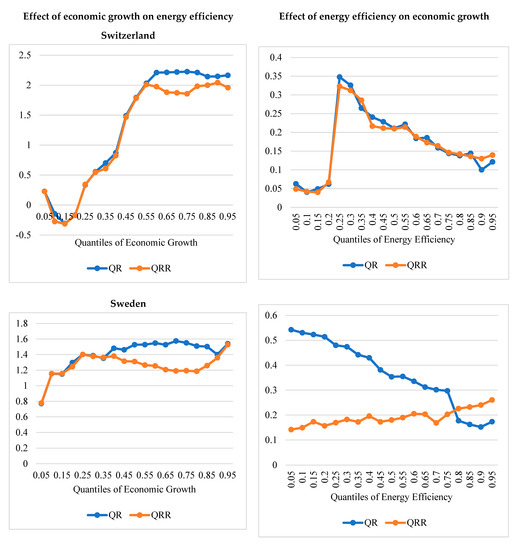
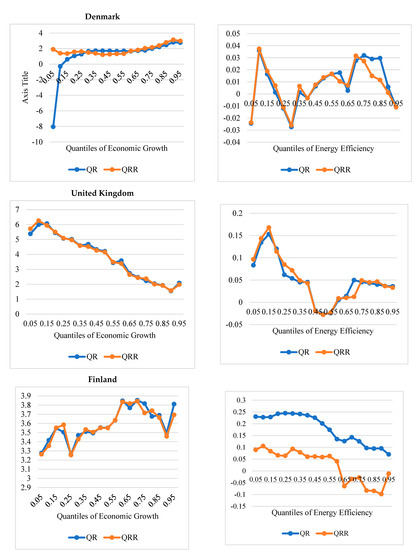
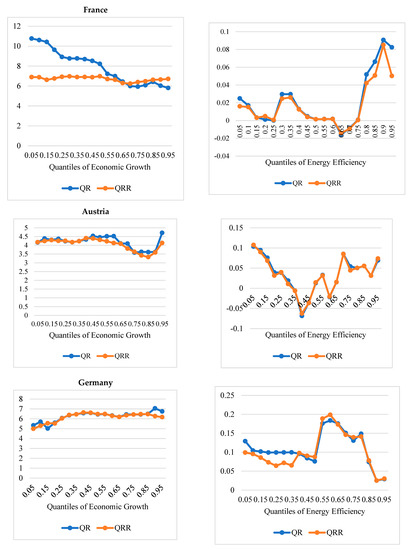
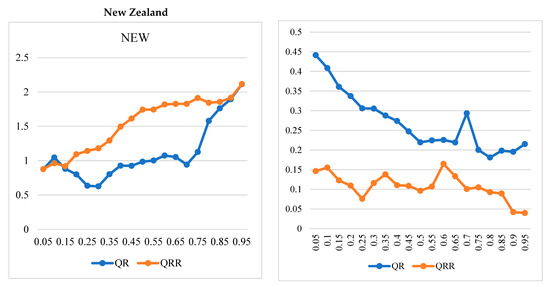
Figure 4.
Comparison of Quantile Regression and Quantile on Quantile estimates. Source: Authors’ computation.
Unfolding the coefficients’ size, the larger positive effect of GDP on energy efficiency is established in Austria, the United Kingdom, France, Germany, and Finland, while a comparable low coefficient is found in New Zealand, Sweden, and Switzerland. The same explanation grasps when the present research examined the effect of energy efficiency on GDP. Figure 2 approves the outcomes elucidated previously utilizing the QQ method. The influence of energy efficiency on GDP is positive, specifically at the low and high quantiles in all nations except Denmark and Finland. The graphs portray that the average slope coefficients of the QQ estimate are closely linked to the coefficient of QR for all the nations. Figure 2 confirms the prior outcomes of this research that demonstrated that the effect of the energy efficiency on GDP is positive across the quantiles in Sweden, New Zealand, Switzerland, and Germany. However, the influence of energy efficiency on GDP is negative mainly in the medium quantiles for United Kingdom and Austria and high quantiles for Finland and France. Discussing coefficients’ size, the greater effect of energy efficiency on GDP is established in New Zealand, Finland, Sweden, and Switzerland.
5. Conclusions and Policy
The annual Energy Trilemma Index ranked the world’s economies according to their performance on environmental sustainability, energy equity, and energy security. Accordingly, the World Energy Council in 2019 framed Austria, Denmark, France, Finland, Germany, Luxembourg, New Zealand, Sweden, Switzerland, and the United Kingdom as the best performing economies in the aspects of environmental sustainability, energy equity, and energy security. Considering the economic growth and development progress of the aforementioned countries (except Luxembourg, which was excluded because of data limitation) and their respective energy utilizations, the current study examined the relationship between GDP and energy efficiency. Thus, adding to the novelty in the case selection, the current study employed the quantile-on-quantile approach of [29] by using the quarterly data for the period of 1990Q1–2018Q4. Consequently, the results largely revealed a significant and positive influence of economic growth on energy efficiency in the quantile for the examined countries (Austria, Denmark, France, Finland, Germany, New Zealand, Sweden, Switzerland, and the United Kingdom). In the reverse circumstance, energy efficiency influences economic growth in the larger parts of the quantiles in the countries. However, a weak and negative interaction is observed in the lower quantile (average of 0.1–0.3) only for Denmark, Germany, and New Zealand, while a weak and negative interaction is noticed in the middle quantile (average 0.4–0.6) for France, Finland, and Sweden. Considering the result of the investigation, there are relevant policy fundamentals for adoption and implementation.
Policy Insight
The top ten performing countries of the Energy Trilemma Index are dominated by the EU member states, an indication of the region’s recent energy efficiency achievement. Taking a clue from the existing EU energy efficiency measures, i.e., the eco-design for products and buildings directive (2009/125/EC), labeling directive (2017/1369/EU), and buildings’ energy performance directive (2010/31/EU) [68], the EU and other regional energy-efficiency measures could be extended to other socioeconomic activities. Particularly, the domestication of energy efficiency and related directives such as codes and standards, energy building standards, etc., in these countries and other inclined economies should be carefully pursued in the framework of environmental sustainability, energy equity, and energy security. Additionally, the growth path of these economies should be further geared toward inclusiveness by adopting green- and environmental sustainability-inclined measures across the sectors of the economy.
Author Contributions
Methodology, T.S.A.; Formal analysis, T.S.A.; Investigation, T.S.A.; Data curation, A.A.A.; Writing—original draft, A.A.A. and I.O.O.; Writing—review & editing, A.A.A. All authors have read and agreed to the published version of the manuscript.
Funding
This research received no external funding.
Data Availability Statement
Data was retrieved from free online databases and the information has been provided in the manuscript.
Conflicts of Interest
The authors declare no conflict of interest.
References
- Abulfotuh, F. Energy efficiency and renewable technologies: The way to sustainable energy future. Desalination 2007, 209, 275–282. [Google Scholar] [CrossRef]
- Bataille, C.; Melton, N. Energy efficiency and economic growth: A retrospective CGE analysis for Canada from 2002 to 2012. Energy Econ. 2017, 64, 118–130. [Google Scholar] [CrossRef]
- Stern, D.I. Modeling international trends in energy efficiency. Energy Econ. 2012, 34, 2200–2208. [Google Scholar] [CrossRef]
- Herring, H. Energy efficiency—A critical view. Energy 2006, 31, 10–20. [Google Scholar] [CrossRef]
- Rajbhandari, A.; Zhang, F. Does energy efficiency promote economic growth? Evidence from a multicountry and multisectoral panel dataset. Energy Econ. 2018, 69, 128–139. [Google Scholar] [CrossRef]
- Bayar, Y.; Gavriletea, M.D. Energy efficiency, renewable energy, economic growth: Evidence from emerging market economies. Qual. Quant. 2019, 53, 2221–2234. [Google Scholar] [CrossRef]
- Marques, A.C.; Fuinhas, J.A.; Tomás, C. Energy efficiency and sustainable growth in industrial sectors in European Union countries: A nonlinear ARDL approach. J. Clean. Prod. 2019, 239, 118045. [Google Scholar] [CrossRef]
- Akram, R.; Chen, F.; Khalid, F.; Huang, G.; Irfan, M. Heterogeneous effects of energy efficiency and renewable energy on economic growth of BRICS countries: A fixed effect panel quantile regression analysis. Energy 2021, 215, 119019. [Google Scholar] [CrossRef]
- Zakari, A.; Khan, I.; Tan, D.; Alvarado, R.; Dagar, V. Energy efficiency and sustainable development goals (SDGs). Energy 2022, 239, 122365. [Google Scholar] [CrossRef]
- Lu, Y.; Liu, Y.; Zhou, M. Rebound effect of improved energy efficiency for different energy types: A general equilibrium analysis for China. Energy Econ. 2017, 62, 248–256. [Google Scholar] [CrossRef]
- Sinha, A. Modeling energy efficiency and economic growth: Evidences from India. Int. J. Energy Econ. Policy 2015, 5, 96. [Google Scholar]
- Razzaq, A.; Sharif, A.; Najmi, A.; Tseng, M.L.; Lim, M.K. Dynamic and causality interrelationships from municipal solid waste recycling to economic growth, carbon emissions and energy efficiency using a novel bootstrapping autoregressive distributed lag. Resources. Conserv. Recycl. 2021, 166, 105372. [Google Scholar] [CrossRef]
- Sener, S.; Karakas, A.T. The effect of economic growth on energy efficiency: Evidence from high, upper-middle and lower-middle income countries. Procedia Comput. Sci. 2019, 158, 523–532. [Google Scholar] [CrossRef]
- Lin, B.; Zhou, Y. Does energy efficiency make sense in China? Based on the perspective of economic growth quality. Sci. Total Environ. 2022, 804, 149895. [Google Scholar] [CrossRef] [PubMed]
- World Energy Council. World Energy Trilemma Index 2020. 2020. Available online: https://www.worldenergy.org/publications/entry/world-energy-trilemma-index-2019 (accessed on 14 January 2021).
- World Energy Council. Policies for the Future, 2011 Assessment of Country Energy and Climate Policies. 2011. Available online: http://www.worldenergy.org/documents/wec_2011_assessment_of_energy_and_climate_policies.pdf (accessed on 20 July 2022).
- Shirazi, M. Assessing energy trilemma-related policies: The world’s large energy user evidence. Energy Policy 2022, 167, 113082. [Google Scholar] [CrossRef]
- Al Asbahi AA, M.H.; Gang, F.Z.; Iqbal, W.; Abass, Q.; Mohsin, M.; Iram, R. Novel approach of principal component analysis method to assess the national energy performance via Energy Trilemma Index. Energy Rep. 2019, 5, 704–713. [Google Scholar] [CrossRef]
- Gunningham, N. Managing the energy trilemma: The case of Indonesia. Energy Policy 2013, 54, 184–193. [Google Scholar] [CrossRef]
- Heffron, R.J.; McCauley, D.; Sovacool, B.K. Resolving society’s energy trilemma through the Energy Justice Metric. Energy Policy 2015, 87, 168–176. [Google Scholar] [CrossRef]
- Jing, R.; Lin, Y.; Khanna, N.; Chen, X.; Wang, M.; Liu, J.; Lin, J. Balancing the Energy Trilemma in energy system planning of coastal cities. Appl. Energy 2021, 283, 116222. [Google Scholar] [CrossRef]
- Oliver, J.; Sovacool, B. The energy trilemma and the smart grid: Implications beyond the United States. Asia Pac. Policy Stud. 2017, 4, 70–84. [Google Scholar] [CrossRef]
- Sautter, J.A.; Landis, J.; Dworkin, M.H. The Energy Trilemma in the Green Mountain State: An Analysis of Vermont’s Energy Challenges and Policy Options. Vt. J. Envt. L. 2008, 10, 477. [Google Scholar] [CrossRef]
- Stempien, J.P.; Chan, S.H. Addressing energy trilemma via the modified Markowitz Mean-Variance Portfolio Optimization theory. Appl. Energy 2017, 202, 228–237. [Google Scholar] [CrossRef]
- Iqbal, W.; Altalbe, A.; Fatima, A.; Ali, A.; Hou, Y. A DEA approach for assessing the energy, environmental and economic performance of top 20 industrial countries. Processes 2019, 7, 902. [Google Scholar] [CrossRef]
- Alola, A.A.; Olanipekun, I.O.; Shah, M.I. Examining the drivers of alternative energy in leading energy sustainable economies: The trilemma of energy efficiency, energy intensity and renewables expenses. Renew. Energy 2023, 202, 1190–1197. [Google Scholar] [CrossRef]
- Filippini, M.; Hunt, L.C. Measurement of energy efficiency based on economic foundations. Energy Econ. 2015, 52, S5–S16. [Google Scholar] [CrossRef]
- Wu, F.; Fan, L.W.; Zhou, P.; Zhou, D.Q. Industrial energy efficiency with CO2 emissions in China: A nonparametric analysis. Energy Policy 2012, 49, 164–172. [Google Scholar] [CrossRef]
- Sim, N.; Zhou, H. Oil prices, US stock return, and the dependence between their quantiles. J. Bank. Financ. 2015, 55, 1–8. [Google Scholar] [CrossRef]
- Solow, R.M. A contribution to the theory of economic growth. Q. J. Econ. 1956, 70, 65–94. [Google Scholar] [CrossRef]
- Chenery, H.B.; Robinson, S.; Syrquin, M.; Feder, S. Industrialization and Growth; Oxford University Press: New York, NY, USA, 1986; p. 175. [Google Scholar]
- De Coninck, H.; Fischer, C.; Newell, R.G.; Ueno, T. International technology-oriented agreements to address climate change. Energy Policy 2008, 36, 335–356. [Google Scholar] [CrossRef]
- Du, H.; Matisoff, D.C.; Wang, Y.; Liu, X. Understanding drivers of energy efficiency changes in China. Appl. Energy 2016, 184, 1196–1206. [Google Scholar] [CrossRef]
- Newell, R.G. The role of markets and policies in delivering innovation for climate change mitigation. Oxf. Rev. Econ. Policy 2010, 26, 253–269. [Google Scholar] [CrossRef]
- Sjöholm, F. Technology gap, competition and spillovers from direct foreign investment: Evidence from establishment data. J. Dev. Stud. 1999, 36, 53–73. [Google Scholar] [CrossRef]
- Worrell, E.; Van Berkel, R.; Zhou, F.; Menke, C.; Schaeffer, R.; Williams, R.O. Technology transfer of energy efficient technologies in industry: A review of trends and policy issues. Energy Policy 2001, 29, 29–43. [Google Scholar] [CrossRef]
- Cantore, N.; Calì, M.; Velde, D.W. Does energy efficiency improve technological change and economic growth in developing countries? Energy Policy 2016, 92, 279–285. [Google Scholar] [CrossRef]
- Smulders, S.; De Nooij, M. The impact of energy conservation on technology and economic growth. Resour. Energy Econ. 2003, 25, 59–79. [Google Scholar] [CrossRef]
- Adedoyin, F.F.; Bekun, F.V.; Alola, A.A. Growth impact of transition from non-renewable to renewable energy in the EU: The role of research and development expenditure. Renew. Energy 2020, 159, 1139–1145. [Google Scholar] [CrossRef]
- Alola, A.A.; Saint Akadiri, S. Clean energy development in the United States amidst augmented socioeconomic aspects and country-specific policies. Renew. Energy 2021, 169, 221–230. [Google Scholar] [CrossRef]
- Aqeel, A.; Butt, M.S. The relationship between energy consumption and economic growth in Pakistan. Asia-Pac. Dev. J. 2001, 8, 101–110. [Google Scholar]
- Ayres, R.U.; Turton, H.; Casten, T. Energy efficiency, sustainability and economic growth. Energy 2007, 32, 634–648. [Google Scholar] [CrossRef]
- Kose, N.; Bekun, F.V.; Alola, A.A. Criticality of sustainable research and development-led growth in EU: The role of renewable and non-renewable energy. Environ. Sci. Pollut. Res. 2020, 27, 12683–12691. [Google Scholar] [CrossRef]
- Lawal, A.I.; Ozturk, I.; Olanipekun, I.O.; Asaleye, A.J. Examining the linkages between electricity consumption and economic growth in African economies. Energy 2020, 208, 118363. [Google Scholar] [CrossRef]
- Lee, C.C. Energy consumption and GDP in developing countries: A cointegrated panel analysis. Energy Econ. 2005, 27, 415–427. [Google Scholar] [CrossRef]
- Ozturk, I. A literature survey on energy–growth nexus. Energy Policy 2010, 38, 340–349. [Google Scholar] [CrossRef]
- Kraft, J.; Kraft, A. On the relationship between energy and GNP. J. Energy Dev. 1978, 3, 401–403. [Google Scholar]
- Intergovernmental Panel on Climate Change (IPCC). Intergovernmental Panel on Climate Change (IPCC) Renewable energy sources and climate change mitigation. 2020. Available online: https://www.ipcc.ch/report/renewable-energy-sources-and-climate-change-mitigation/ (accessed on 20 July 2022).
- Liu, H.; Khan, I.; Zakari, A.; Alharthi, M. Roles of trilemma in the world energy sector and transition towards sustainable energy: A study of economic growth and the environment. Energy Policy 2022, 170, 113238. [Google Scholar] [CrossRef]
- Norouzi, N. Regulating sustainable economics: A legal and policy analysis in the light of the United Nations sustainable development goals. In Handbook of Research on Changing Dynamics in Responsible and Sustainable Business in the Post-COVID-19 Era; IGI Global: Hershey, PA, USA, 2022; pp. 266–287. [Google Scholar]
- Howarth, R.B. Energy efficiency and economic growth. Contemp. Econ. Policy 1997, 15, 1–9. [Google Scholar] [CrossRef]
- Farla, J.C.; Blok, K. Energy efficiency and structural change in the Netherlands, 1980–1995: Influence of energy efficiency, dematerialization, and economic structure on national energy consumption. J. Ind. Ecol. 2000, 4, 93–117. [Google Scholar] [CrossRef]
- Zhu, J.; Lin, B. Economic growth pressure and energy efficiency improvement: Empirical evidence from Chinese cities. Appl. Energy 2022, 307, 118275. [Google Scholar] [CrossRef]
- Dell’Anna, F. Green jobs and energy efficiency as strategies for economic growth and the reduction of environmental impacts. Energy Policy 2021, 149, 112031. [Google Scholar] [CrossRef]
- Li, H.; Shi, J.F. Energy efficiency analysis on Chinese industrial sectors: An improved Super-SBM model with undesirable outputs. J. Clean. Prod. 2014, 65, 97–107. [Google Scholar] [CrossRef]
- Wang, Q.; Zhao, Z.; Zhou, P.; Zhou, D. Energy efficiency and production technology heterogeneity in China: A meta-frontier DEA approach. Econ. Model. 2013, 35, 283–289. [Google Scholar] [CrossRef]
- Wang, Z.; Feng, C.; Zhang, B. An empirical analysis of China’s energy efficiency from both static and dynamic perspectives. Energy 2014, 74, 322–330. [Google Scholar] [CrossRef]
- Cagno, E.; Trianni, A. Exploring drivers for energy efficiency within small-and medium-sized enterprises: First evidences from Italian manufacturing enterprises. Appl. Energy 2013, 104, 276–285. [Google Scholar] [CrossRef]
- Li, K.; Lin, B. How to promote energy efficiency through technological progress in China? Energy 2018, 143, 812–821. [Google Scholar] [CrossRef]
- Hu, J.L.; Wang, S.C. Total-factor energy efficiency of regions in China. Energy Policy 2006, 34, 3206–3217. [Google Scholar] [CrossRef]
- Song, L.; Fu, Y.; Zhou, P.; Lai, K.K. Measuring national energy performance via energy trilemma index: A stochastic multicriteria acceptability analysis. Energy Econ. 2017, 66, 313–319. [Google Scholar] [CrossRef]
- Xia, Z.; Abbas, Q.; Mohsin, M.; Song, G. Trilemma among energy, economic and environmental efficiency: Can dilemma of EEE address simultaneously in era of COP 21? J. Environ. Manag. 2020, 276, 111322. [Google Scholar] [CrossRef]
- Broock, W.A.; Scheinkman, J.A.; Dechert, W.D.; LeBaron, B. A test for independence based on the correlation dimension. Econom. Rev. 1996, 15, 197–235. [Google Scholar] [CrossRef]
- Organization for Economic Corporation and Development. 2021. Available online: https://data.oecd.org/gga/general-government-revenue.htm#indicator-chart (accessed on 13 May 2021).
- European Environment Agency. Progress on energy efficiency in Europe. 2021. Available online: https://www.eea.europa.eu/data-and-maps/indicators/progress-on-energy-efficiency-in-europe-3/assessment (accessed on 13 May 2021).
- International Trade Administration. Energy and Environmental Technology. 2020. Available online: https://www.trade.gov/country-commercial-guides/finland-energy-and-environmental-technology (accessed on 13 May 2021).
- Organization for Economic Corporation and Development. Green growth in action: Germany. 2020. Available online: https://www.oecd.org/germany/greengrowthinactiongermany.htm (accessed on 13 May 2021).
- European Parliament. Energy efficiency. 2020. Available online: https://www.europarl.europa.eu/factsheets/en/sheet/69/energy-efficiency (accessed on 13 May 2021).
Disclaimer/Publisher’s Note: The statements, opinions and data contained in all publications are solely those of the individual author(s) and contributor(s) and not of MDPI and/or the editor(s). MDPI and/or the editor(s) disclaim responsibility for any injury to people or property resulting from any ideas, methods, instructions or products referred to in the content. |
© 2023 by the authors. Licensee MDPI, Basel, Switzerland. This article is an open access article distributed under the terms and conditions of the Creative Commons Attribution (CC BY) license (https://creativecommons.org/licenses/by/4.0/).

